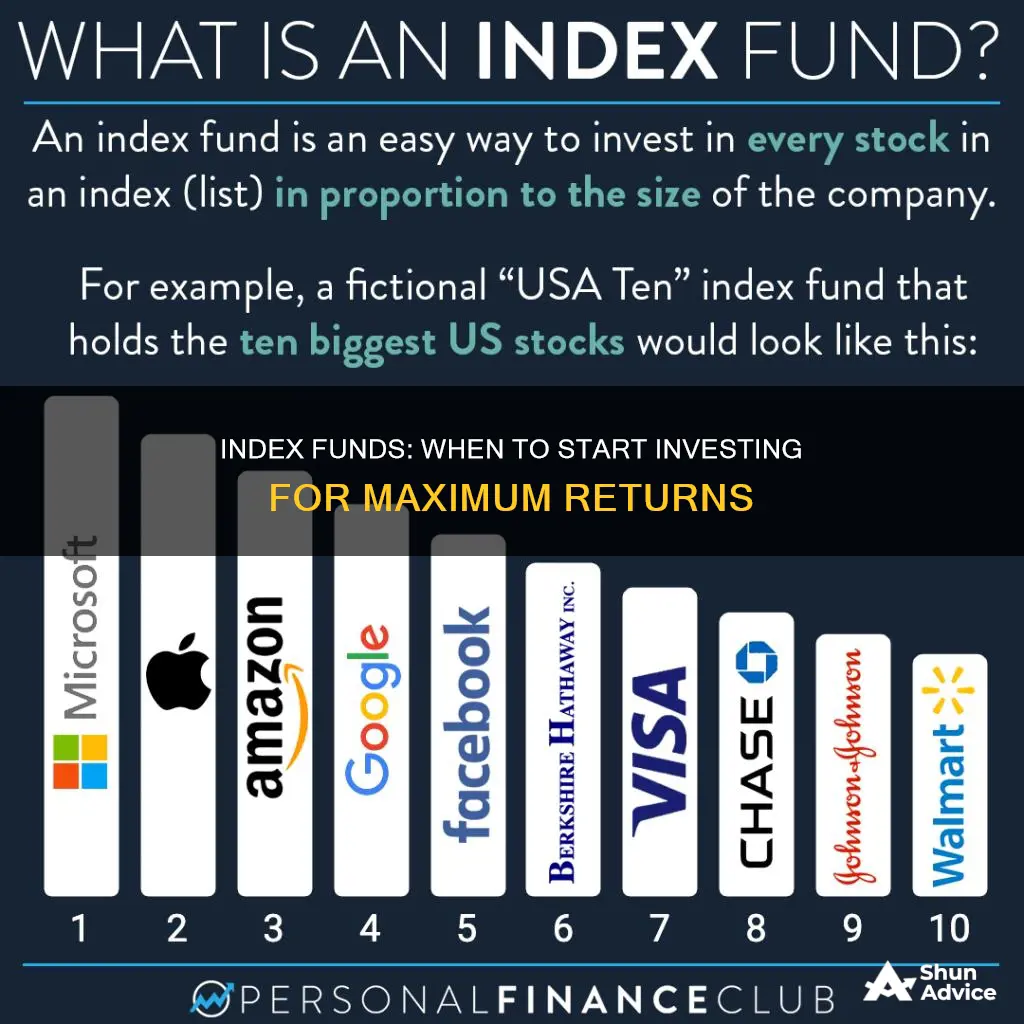
Index funds are a great investment option for those looking to build wealth over the long term. They are a type of mutual fund or exchange-traded fund (ETF) that tracks the performance of a specific market index, such as the S&P 500 or the Dow Jones Industrial Average. By investing in an index fund, you can expect the fund to closely mirror the performance of the underlying index, with no hands-on management necessary. One of the biggest advantages of index funds is that they are passively managed, which means lower fees for investors. Additionally, index funds offer built-in diversification, minimal maintenance, and tax efficiency. However, one of the trade-offs of investing in index funds is giving up control over the exact composition of your portfolio. In this article, we will discuss the benefits and drawbacks of investing in index funds, as well as provide a step-by-step guide on how to get started.
| Characteristics | Values |
|---|---|
| Investment goals | Clear goals and timelines are important before investing in index funds. |
| Investment strategy | Pick an index fund strategy that aligns with your goals and timelines. |
| Index funds research | Research the types of indexes and individual funds that track them. |
| Investment account | Open an investment account before purchasing your first index funds. |
| Investment plan | Set up a plan to keep investing regularly and review your investments. |
| Exit strategy | Consider when you'll sell your shares and the associated tax implications. |
What You'll Learn

Index funds vs. individual stocks
Index funds are a type of investment vehicle that tracks a market index such as the S&P 500 or the Russell 2000. They are passively managed, meaning that investment decisions are based on trying to match the index. Index funds are typically mutual funds or exchange-traded funds (ETFs) and hold a wide variety of securities, from stocks to bonds.
Individual stocks, on the other hand, are a form of ownership in a single publicly-traded company. This means that the risk and return of individual stocks are dependent on the fortunes of that company.
Benefits of Index Funds Over Individual Stocks
Index funds have several benefits over individual stocks. Firstly, they are more diversified, reducing risk. Secondly, they are less effort as they don't require the same level of research and attention to performance. Thirdly, they tend to have lower fees, as they are passively managed and don't require fund managers to actively pick stocks.
Benefits of Individual Stocks Over Index Funds
The main benefit of individual stocks is the potential for higher returns. While index funds tend to match the market, individual stocks can outperform the market if the company does well.
When to Choose Index Funds Over Individual Stocks
Index funds are generally a better choice for beginners or those who don't have the time or interest to research and pick stocks. They are also a good option for those who want to diversify their portfolio and reduce risk.
When to Choose Individual Stocks Over Index Funds
If you have the knowledge, time, and interest to research and pick stocks, and you are comfortable with the higher risk, then individual stocks may be a good choice. Individual stocks can also be a way to add more specificity to your portfolio, such as investing in companies that align with your values.
Combining Index Funds and Individual Stocks
It is also possible to combine index funds and individual stocks in your portfolio. This can provide the benefits of diversification and lower fees from index funds, while still allowing you to pick specific stocks that you believe will outperform the market.
Ultimately, the decision to invest in index funds or individual stocks depends on your financial goals, risk tolerance, and the amount of time and effort you are willing to put into researching and managing your investments.
IRA and Mutual Funds: A Smart Investment Strategy
You may want to see also

Benefits of index funds
Index funds are considered one of the smartest types of investments. Here are some of the benefits of investing in index funds:
Broad diversification
Investing in index funds instantly diversifies your portfolio, reducing the likelihood of losing some or all of your money. For example, an index fund that tracks the S&P 500 would hold about 500 different stocks. By investing in a fund that holds all of them, your portfolio's performance matches that of the index itself. Diversifying your portfolio across so many companies ensures that the value of your portfolio is not overly correlated with the fortunes of any one company listed in the index.
Low costs
Index funds have lower management fees than other funds because they are passively managed. Instead of having a manager actively trading, the index fund's portfolio duplicates that of its designated index, which rarely changes. The expense ratio is comparatively low because there is little work required of the index fund manager. Index funds' expense ratios typically range between 0.05% and 0.07%, and some have ratios as low as 0%.
Lower taxes on capital gains
Index funds have lower turnover ratios than actively managed funds. They have lower transaction costs and trade in and out of securities less frequently, generating less taxable income that must be passed along to shareholders.
Attractive returns
Index funds have consistently beaten other types of funds in terms of total return. Even the smartest and most diligent portfolio managers can rarely steer actively managed funds to beat index funds. Only about 23% of actively managed mutual funds outperform the S&P 500 over five years.
Choosing the Right Brokerage: Investment Funds Explained
You may want to see also

Types of index funds
Index funds are a type of investment vehicle that aims to match the returns of a specific market index. They are a great way to build wealth at a low cost and are popular due to their simplicity and diversification benefits.
Broad Market Index Funds
Broad market index funds aim to capture most of an investable market, which could include stocks, bonds, or other assets. They are a great option if you're looking for low-cost exposure to an entire asset class or a specific country or region. Examples include the Vanguard Total Stock Market ETF and the Schwab U.S. Broad Market ETF.
Market Cap Index Funds
Market cap index funds invest based on specific market capitalization ranges. A company's market cap is the total value of its outstanding shares, and these funds invest in companies with different market caps. Large-cap funds, such as those tracking the S&P 500, hold companies with market caps above $10 billion, while small-cap funds invest in companies with market caps below $2 billion. Examples include the Fidelity 500 Index Fund and the iShares Russell 2000 ETF.
Equal Weight Index Funds
Most stock index funds are weighted by market cap, but equal weight index funds give each holding in the fund an equal percentage of fund assets. For example, if a fund has 100 holdings, each one will account for about 1% of the portfolio. Popular equal weight funds include the Invesco S&P 500 Equal Weight ETF and the Direxion Nasdaq-100 Equal Weighted Index Shares.
Fixed Income/Debt Index Funds
Fixed income or debt index funds allow investors to invest in bonds through index funds. These funds track bond indices in the same way that stock funds track stock market indices, allowing them to charge low expense ratios compared to actively managed funds. Examples include the Vanguard Long-Term Bond ETF and the iShares 1-5 Year Investment Grade Corporate Bond ETF.
Sector-Based Index Funds
Sector-based index funds are great if you have a specific view on a certain area of the economy. These funds allow you to express an investment opinion without having to research individual securities. Examples include the Consumer Discretionary Select Sector SPDR Fund, which tracks a consumer discretionary index, and the Vanguard Communication Services Index Fund, which focuses on companies providing communication services.
International Index Funds
International index funds provide an easy way to gain exposure to geographic areas outside your home country. You can purchase a diversified portfolio of international companies through a single fund. Examples include the Vanguard FTSE Emerging Markets ETF, which invests in countries such as China, Taiwan, South Africa, and Brazil, and the iShares Core MSCI Total International Stock ETF, which invests in both developed and emerging international markets.
Socially Responsible Index Funds
Socially responsible index funds have gained popularity as investors increasingly care about how their money is invested. These funds may include companies with a focus on environmental, social, and governance (ESG) issues or exclude companies involved in the sale of firearms, alcohol, tobacco, adult entertainment, or gambling. Examples include the Vanguard ESG U.S. Stock ETF, which screens for ESG criteria, and the iShares Global Clean Energy ETF, which focuses on companies in the clean energy sector.
Trust Fund Investment Strategies: Where to Begin?
You may want to see also

Risks of index funds
Index funds are a type of investment vehicle that tracks a market index, such as the S&P 500 or the Russell 2000. While they offer a range of benefits, including diversification, low fees, and tax advantages, there are also several risks associated with investing in index funds. Here are some key points to consider:
- Market Risk: Index funds are designed to track the performance of a specific market index. This means that if the index your fund is tracking plunges, your index fund will plunge as well. For example, during a market downturn or correction, your index fund may lose value along with the broader market.
- Concentration Risk: Index funds invest based on the underlying indices they track. As a result, they may have concentrated positions in a few large companies that dominate the index. For instance, the "Magnificent Seven" stocks (Apple, Microsoft, Amazon, Tesla, Nvidia, UnitedHealth Group, and Meta) accounted for about 28% of the S&P 500 index as of October 2023. This concentration can impact the diversification benefits of the fund.
- Underperformance Risk: While index funds aim to match the performance of their underlying index, they may sometimes underperform. This can occur due to tracking errors, where the fund fails to accurately replicate the index's performance. Additionally, the back-tested performance of an index may look promising, but it may not always live up to expectations once the fund starts tracking it.
- Volatility Risk: Index funds can be volatile, especially when the economy or stock market is not performing well. They track their respective markets in both good and bad times, so investors are exposed to the full impact of market volatility.
- Limited Control: With index funds, investors have limited control over the specific stocks or securities held within the fund. The fund's performance is largely dependent on the underlying index, and investors cannot make adjustments to individual holdings.
- Sector or Industry Risk: Depending on the index chosen, investors may have exposure to specific sectors or industries that are more volatile or prone to downturns. For example, investing in a technology-focused index fund may carry different risks compared to a fund focused on consumer staples.
- Bond Index Fund Risk: Even "safe" investments like bond index funds can lose money. Factors such as rising interest rates or credit downgrades can lead to losses in bond index funds. High-yield bond index funds, also known as "junk bond" funds, carry a higher risk of default or loss.
It's important to remember that investing in index funds, like any other investment, carries risks. Understanding these risks and conducting thorough research before investing is essential for making informed investment decisions.
Hedge Fund Investment Strategies: Where and How They Invest
You may want to see also

How to buy index funds
Index funds are a great way to build wealth over the long term. They are a type of investment vehicle that aims to match the returns of a specific market index, like the S&P 500 or the Russell 2000. Index funds are passively managed, meaning they don't require active fund managers to decide which investments to buy or sell. This passive management style helps keep fees low, making index funds an attractive investment option.
- Open an investment account: Different types of investment accounts are suited for different goals. For example, taxable brokerage accounts are good for building wealth but may incur taxes. Retirement accounts like an IRA or 401(k) provide tax benefits for long-term investing. You can also consider 529 plans for educational expenses or custodial accounts for investing on behalf of a child.
- Decide on your investment strategy: Consider your financial goals, risk tolerance, and timeline. If you work with a financial advisor, they can help determine the best mix of funds. Online tools are also available to guide your strategy, such as questionnaires and investment strategy tools offered by Vanguard and Fidelity.
- Research your index funds: Pick one or more indexes to track. Popular indexes include the S&P 500, Dow Jones Industrial Average, NASDAQ, and Russell 2000. Compare index funds based on factors like expense ratios, fees, and investment minimums.
- Buy the index funds: Open a brokerage account and purchase shares of the index funds you've selected. You'll need to meet the fund's investment minimum, but after that, you can typically buy fractional shares. Decide how you want to allocate your money across different funds.
- Set up your purchase plan: Investing is typically an ongoing practice. Consider setting up automatic investments at regular intervals, a strategy known as dollar-cost averaging.
- Decide on your exit strategy: While buying and holding is a common strategy, it's important to also plan when and how you'll sell your shares, taking into account factors like capital gains taxes.
Index funds are a simple and effective way to invest, offering diversification and low fees. By following these steps, you can start building your index fund portfolio today.
Mutual Funds: Best Time to Invest for Maximum Returns
You may want to see also







